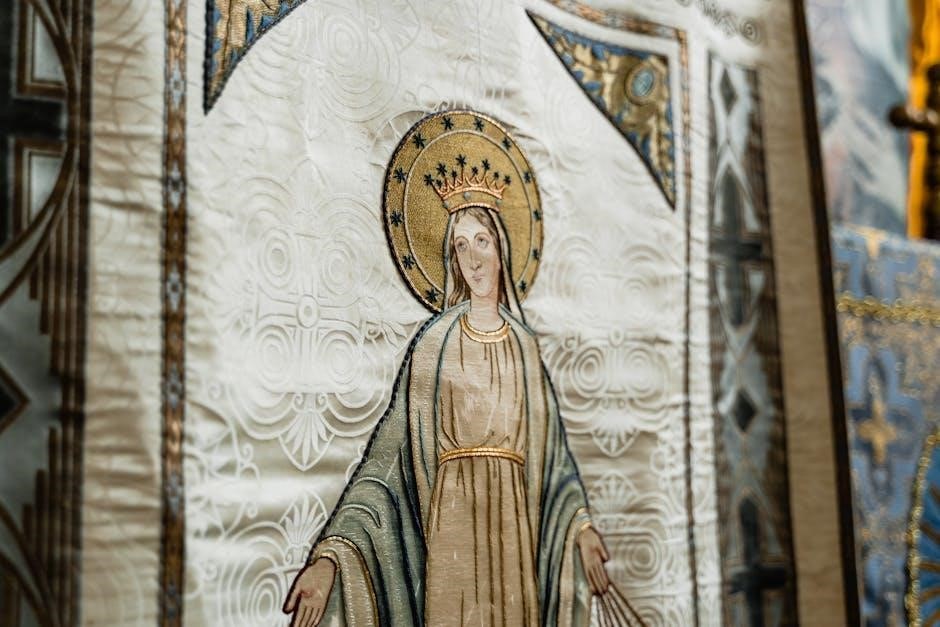Deborah, a prophetess and judge, played a pivotal role in Israel’s history. Married to Lappidoth, she led Israel during King Jabin’s oppression, collaborating with Barak to defeat Sisera, celebrating their victory in her iconic song, showcasing her leadership and unwavering faith in God.
1.1 Who Was Deborah?
Deborah was a prophetess, judge, and leader in ancient Israel, known for her wisdom, courage, and faith. She was the wife of Lappidoth and served as a spiritual and civic leader, mediating disputes and guiding Israel. Her name, meaning “bee,” symbolizes industry and community. Deborah’s leadership was marked by her ability to inspire and unify the tribes of Israel, demonstrating remarkable faith and trust in God. She is celebrated as a mother figure in Israel, embodying strength, discernment, and devotion to her people and God.
1.2 The Significance of Deborah’s Story
Deborah’s story highlights God’s divine intervention through an unlikely leader, showcasing His faithfulness and power. Her role as a prophetess and judge challenges traditional gender roles, demonstrating God’s ability to use anyone for His purposes. Deborah’s unwavering faith and leadership during Israel’s oppression inspire believers to trust God in challenging circumstances. Her victory over Sisera and the song celebrating it serve as a testament to God’s deliverance and the importance of obedience and courage. Deborah’s legacy encourages modern believers to embrace their roles in God’s plan, regardless of societal expectations.

Profile and Background of Deborah
Deborah, a prophetess and judge of Israel, was the wife of Lappidoth. She judged Israel under a palm tree, providing wisdom and guidance to her people.
2.1 The Meaning of the Name “Deborah”
The name Deborah means “bee” in Hebrew, symbolizing industry, wisdom, and community. This name reflects her role as a proactive leader, tirelessly working for Israel’s well-being. Her name also signifies her spiritual diligence, as she buzzed with divine purpose, guiding her people with God-given wisdom. The imagery of a bee aligns with her collaborative and nurturing leadership style, emphasizing teamwork and collective effort. This meaningful name encapsulates her vibrant personality and the significant impact she had on Israel’s history.
2.2 Deborah’s Role as a Prophetess
Deborah, known as a prophetess, served as a divine messenger, receiving direct revelations from God. Her role involved guiding Israel spiritually and politically, ensuring God’s will was fulfilled. The Israelites recognized her authority, seeking her counsel under the palm tree where she held court. Deborah’s prophecies were clear and authoritative, as seen when she instructed Barak to lead the battle against Sisera. Her prophetic words ignited faith and action, showcasing her deep connection with God and her ability to inspire others to trust Him. This role underscored her spiritual leadership and wisdom.
2.3 Deborah’s Husband and Family Life
Deborah was married to Lappidoth, whose name means “torch” or “light-bringer,” symbolizing his supportive role in her life. While the Bible provides little detail about her family, it emphasizes her spiritual and leadership roles. Her marriage likely reflected the cultural norms of ancient Israel, where women’s domestic lives were often intertwined with societal expectations. Despite the lack of personal details, Deborah’s divine calling and leadership highlight her unique position as a woman chosen by God for a significant mission, transcending traditional family roles.
2.4 Deborah as a Judge in Israel
Deborah served as a respected judge in Israel, mediating disputes under a palm tree. Known for her wisdom, she was a trusted leader, guiding her people with God-given discernment. Her role extended beyond judiciary duties, inspiring hope and unity, and her leadership brought stability and peace to Israel.

Deborah’s Prophetic Role
Deborah’s prophetic role was marked by her divine calling and unwavering trust in God, guiding Israel with wisdom and courage, as she delivered His message to Barak.
3.1 The Call of Deborah by God
Deborah’s call by God was a divine intervention during Israel’s oppression. She was chosen as a prophetess and judge, entrusted with delivering God’s message to Barak, urging him to lead the battle against Sisera. Her faith and obedience exemplified her deep connection with God, allowing her to fulfill her prophetic role effectively;
3.2 Deborah’s Message to Barak
Deborah received a divine command to instruct Barak, summoning him to gather 10,000 men and prepare for battle against Sisera. Despite his hesitation, Deborah assured him of God’s presence and victory. Barak, lacking full faith, requested Deborah’s accompaniment, to which she agreed, prophetically warning him that the glory would go to a woman. Her message reflected unwavering trust in God’s plan, demonstrating her role as both a prophetess and a leader.
3.3 The Prophetess and Her Leadership
Deborah’s leadership as a prophetess was marked by her ability to unite the tribes of Israel under God’s authority. She served as a judge, mediating disputes and guiding her people with wisdom. Her prophetic gift allowed her to deliver God’s commands with clarity and authority, earning the trust of the Israelites. Deborah’s leadership style exemplified courage, faith, and humility, as she relied on divine guidance to navigate challenges and inspire others to trust in God’s deliverance.

Deborah’s Military Victory
Deborah’s military victory over the Canaanites, led by Sisera, showcased her unwavering faith in God. With Barak, she defeated Sisera, and Jael completed the victory, demonstrating God’s power.
4.1 The Battle Against the Canaanites
Deborah, a prophetess and judge, led Israel against the Canaanites under King Jabin, who oppressed them for 20 years. Guided by God, she summoned Barak to gather forces. Despite Barak’s hesitancy, Deborah assured him of divine support. The battle ensued near Mount Tabor, resulting in the defeat of Sisera, Jabin’s commander. Jael, a Kenite woman, delivered the final blow, solidifying the victory. This triumph marked a turning point, freeing Israel from Canaanite rule and showcasing Deborah’s faith and leadership.
4.2 Deborah’s Strategy and Faith
Deborah’s strategy against the Canaanites was rooted in her unwavering faith in God. She received a divine directive to instruct Barak to assemble 10,000 men from Naphtali and Zebulun, promising God’s presence in the battle. Despite Barak’s reluctance, Deborah’s courage and trust in God’s plan were unshakable. Her leadership exemplified reliance on divine guidance, demonstrating how faith can overcome human doubts and fears, leading to a victorious outcome.
4.3 The Victory Over Sisera
Deborah’s leadership culminated in a decisive victory over Sisera, the Canaanite general. Guided by divine instructions, she directed Barak to confront Sisera’s army at Mount Tabor. Despite initial hesitation, Barak followed her plan, and God intervened, causing confusion among the enemy forces. Sisera fled but was slain by Jael, a Kenite woman. This triumph showcased Deborah’s trust in God’s plan and her strategic foresight, leading Israel to a significant victory and securing a period of peace under her leadership.

The Song of Deborah
The Song of Deborah, found in Judges 5, is a triumphant hymn celebrating Israel’s victory over the Canaanites. It praises God’s deliverance and Jael’s bravery, reflecting Deborah’s deep faith and leadership.
5.1 The Historical Context of the Song
The Song of Deborah is rooted in Israel’s liberation from Canaanite oppression under King Jabin. After twenty years of suffering, Deborah, a prophetess and judge, arose as a leader. She collaborated with Barak to gather an army, and their victory over Sisera, Jabin’s commander, is central to the song. Composed after the battle, the song reflects the spiritual and cultural climate of the time, emphasizing God’s intervention and the people’s unity. It captures the joy and gratitude of Israel, celebrating their divine deliverance and restoration of peace.
5.2 Key Themes in Deborah’s Song
Deborah’s Song is a triumphant hymn of praise, celebrating God’s victory over the Canaanites. Central themes include divine intervention, faith, and deliverance. It highlights Deborah’s leadership and the unity of Israel’s tribes, emphasizing God’s power and justice. The song also reflects gratitude for liberation and the restoration of peace, showcasing the spiritual rejoice of the people. Its poetic structure and vivid imagery underscore the miraculous nature of the victory, glorifying God as the ultimate deliverer and protector of His people.
5.3 The Spiritual Significance of the Song
Deborah’s Song holds profound spiritual significance as a declaration of trust in God’s sovereignty. It reflects Israel’s dependence on divine deliverance, celebrating God’s faithfulness and power. The song serves as a testimony to God’s intervention in history, inspiring faith and reverence. Its emphasis on praise and worship underscores the importance of acknowledging God’s role in victory. Spiritually, it reminds believers to trust God’s plans and leadership, while its communal tone fosters unity and shared rejoicing in His providence.

Deborah’s Leadership Traits
Deborah exemplified wisdom, courage, and faith, inspiring the Israelites to trust God. Her leadership unified the tribes, restored faith, and established peace, showcasing her divine calling.
6.1 Courage and Boldness
Deborah’s courage and boldness were evident as she stepped into a male-dominated leadership role, trusting God’s plan despite societal norms. She fearlessly instructed Barak to lead the army, demonstrating unwavering confidence in God’s promise of victory. Her willingness to accompany Barak to battle showcased her determination and trust in divine guidance, inspiring others to follow her lead and embrace faith over fear.
6.2 Wisdom and Discernment
Deborah’s wisdom and discernment were evident in her role as a judge and prophetess. She skillfully mediated disputes and provided divine guidance to Israel. Her ability to discern God’s will and communicate it clearly, as seen in her instructions to Barak, demonstrated her spiritual insight. Deborah’s wisdom also shone in her military strategy, trusting God’s plan to defeat Sisera. Her discernment and reliance on God’s guidance established her as a wise leader, leaving a legacy of prudent decision-making and faith-inspired judgment for future generations to emulate.
6.3 Faith and Trust in God
Deborah’s unwavering faith in God was the cornerstone of her leadership. She trusted God’s plan, even when faced with daunting challenges like the Canaanite oppression. Deborah’s instructions to Barak, “Go! This is the day the Lord will give you victory over Sisera,” reflect her deep trust in divine providence. Her faith inspired others, including Barak, to rely on God’s power rather than human strength. Deborah’s trust in God was evident in her song, where she celebrated His intervention and sovereignty, setting a powerful example of faith for Israel and future generations to follow.
The Historical Context of Deborah’s Time
Deborah lived during Israel’s chaotic period of judges, marked by oppression under King Jabin. Her leadership as a judge and prophetess brought crucial deliverance and restoration.
7.1 The Period of the Judges
The period of the judges was a time of instability in Israel, marked by recurring cycles of sin, oppression, and deliverance. Deborah emerged as a leader during this era, serving as both a prophetess and a judge. Her role was unique, as she combined spiritual guidance with judicial authority, unifying the tribes and restoring order. This chaotic period highlighted the need for divine intervention, setting the stage for Deborah’s transformative leadership and the eventual victory over Canaanite oppression.
7.2 The Oppression by King Jabin
King Jabin, ruler of the Canaanites, subjected Israel to twenty years of harsh oppression, weakening their resolve and faith. His military commander, Sisera, terrorized the population, leaving Israel in a state of despair. Deborah’s emergence as a leader was a direct response to this oppression, as God raised her to deliver His people. The prolonged suffering under Jabin’s rule prepared the stage for Deborah’s miraculous victory, showcasing God’s faithfulness and power over human tyranny.
7.3 The Role of Women in Ancient Israel
In ancient Israel, women typically held domestic roles, with limited public influence. Deborah’s leadership as a prophetess and judge was extraordinary, challenging societal norms. Her role underscored God’s ability to work through women, demonstrating divine equality. Despite the patriarchal culture, Deborah’s wisdom and faith earned her respect, proving that leadership is not confined by gender. Her story highlights the significance of women in Israel’s history, showing how God can use anyone to fulfill His purposes, regardless of societal expectations or gender roles.
Deborah’s Impact on Israel
Deborah unified Israel’s tribes, restored faith, and brought peace. Her leadership inspired future generations, proving God’s power through women, leaving a lasting legacy of courage and faith.
8.1 Unifying the Tribes
Deborah’s leadership played a crucial role in unifying Israel’s tribes. She called upon the tribes to gather and fight against their oppressors, fostering a sense of national identity. Her prophetic authority and courage inspired collective action, leading to their victory over the Canaanites. This unity not only secured their freedom but also strengthened their faith in God, leaving a lasting legacy of collaboration and trust in divine leadership.
8.2 Restoring Faith in God
Deborah’s prophecy and leadership renewed Israel’s faith during a time of oppression. Her obedience to God’s commands and trust in His promises inspired the Israelites to trust Him again. Deborah’s victory over the Canaanites demonstrated God’s power and faithfulness, revitalizing their spiritual hope. Through her song of praise, she reminded Israel of God’s deliverance, strengthening their relationship with Him and restoring their faith in His divine sovereignty and provision.
8.3 Establishing Peace and Order
Deborah’s leadership brought stability and harmony to Israel after years of turmoil. By defeating Sisera and ending Canaanite oppression, she restored peace to the land. Her wise governance and divine guidance ensured justice and order, uniting the tribes under one purpose. The victory led to a period of prosperity, with Deborah’s song celebrating the triumph and reinforcing her role as a leader who brought calm and security to Israel, leaving a lasting legacy of peace and order among the people;

Deborah as a Mother in Israel
Deborah, called a “mother in Israel,” symbolized nurturing leadership. As a prophetess and judge, she guided her people with wisdom, inspiring faith and unity, celebrating God’s deliverance in her song.
9.1 The Symbolism of Motherhood
Deborah’s title as a “mother in Israel” symbolizes her nurturing and protective role. She embodies maternal care, guiding her people with wisdom and compassion, ensuring their spiritual and physical well-being. Her leadership fosters unity and strength, much like a mother’s unwavering support. Through her song, Deborah highlights her maternal instincts, celebrating God’s deliverance and the restoration of peace. This imagery underscores her unique position as both a spiritual and national matriarch, offering inspiration and hope to her nation.
9.2 Deborah’s Role as a Spiritual Mother
Deborah’s role as a spiritual mother reflects her deep connection with God and her people. She nurtured Israel’s faith, guiding them through spiritual darkness and oppression. As a prophetess, she delivered God’s messages, inspiring hope and obedience. Deborah’s collaboration with Barak and her victory song highlight her ability to empower others spiritually. Her leadership embodies a mother’s care, providing guidance, strength, and a steadfast trust in God, making her a powerful spiritual figure for her nation.
9.3 The Legacy of Deborah’s Leadership
Deborah’s leadership left an enduring legacy, inspiring future generations with her courage, wisdom, and faith. As a prophetess, judge, and warrior, she demonstrated that God can use anyone, regardless of gender, to achieve great things. Her victory over Sisera and her song of praise showcased her trust in God and her ability to unify Israel. Deborah’s legacy emphasizes the importance of obedience, boldness, and spiritual motherhood, making her one of the most remarkable figures in biblical history and a timeless example of effective leadership.
Lessons from Deborah for Modern Believers
Deborah’s story teaches faith, courage, and leadership, reminding believers to trust God, embrace boldness, and recognize the value of women in ministry and spiritual roles.
10.1 The Power of Faith and Obedience
Deborah’s unwavering faith in God’s commands exemplifies the power of trust and obedience. She boldly obeyed God’s directive to summon Barak and lead Israel against Sisera, despite the challenges. Her obedience, rooted in faith, led to a miraculous victory, demonstrating how aligning with God’s will can achieve extraordinary outcomes. This teaches modern believers to trust God’s plan, embrace obedience, and act courageously, knowing His guidance leads to triumph and fulfillment of His purpose.
10.2 The Importance of Courage
Deborah’s courage in confronting oppression and leading Israel to victory highlights the transformative power of bravery. Despite the daunting challenge of facing Sisera’s army, she fearlessly obeyed God’s command and inspired Barak to join the battle. Her courage not only led to military triumph but also unified the tribes and restored faith in God. Deborah’s example teaches modern believers to face challenges boldly, trusting in God’s strength, and stepping out in faith even when the task seems impossible, knowing His presence empowers them to overcome adversity.
10.3 The Role of Women in Ministry
Deborah’s role as a prophet, judge, and military leader in the Bible exemplifies the significant influence women can have in ministry. She demonstrated that women could hold authoritative positions and lead effectively, challenging traditional gender roles. Her collaboration with Barak and the victory song showcase her spiritual and strategic leadership. Deborah’s strong faith and trust in God serve as a powerful model for modern women, encouraging them to embrace diverse roles in ministry and trust in God’s empowerment.
Deborah’s extraordinary faith, leadership, and trust in God inspire believers today, demonstrating that women can play pivotal roles in ministry and society, guided by divine purpose.
11.1 Key Takeaways from Deborah’s Story
Deborah’s story highlights her exceptional leadership, unwavering faith, and courage. As a prophetess and judge, she demonstrated God’s empowerment for women in ministry. Her collaboration with Barak underscores the importance of unity and trust in divine plans. Deborah’s song celebrates victory and praises God, serving as a spiritual testament to His faithfulness. Her legacy inspires believers to embrace their roles, trust God’s guidance, and lead with courage, proving that faith and obedience can overcome even the greatest challenges.
11.2 Applying Deborah’s Lessons Today
Deborah’s story teaches modern believers the value of courage, faith, and leadership. Her example encourages women to embrace their roles in ministry and leadership, trusting God’s plan. Deborah’s collaboration with Barak highlights the importance of unity and teamwork. Her unwavering trust in God’s promises inspires believers to face challenges with confidence. Deborah’s song of praise reminds us to glorify God in all victories. Applying these lessons today, we can lead with wisdom, trust God’s guidance, and serve with courage, impact our communities, and fulfill our divine purpose.
11.3 Final Thoughts on Deborah’s Legacy
Deborah’s legacy endures as a testament to God’s empowerment of women in leadership. As a prophetess, judge, and warrior, she exemplified courage, faith, and wisdom. Her victory song celebrates God’s sovereignty, while her leadership united Israel and restored faith. Deborah’s story challenges modern believers to embrace their unique calling, trust God’s promises, and lead with humility. Her influence transcends gender, inspiring all to step into their divine purpose. Deborah’s life remains a powerful reminder of what it means to live faithfully and lead courageously, leaving an indelible mark on biblical history.




